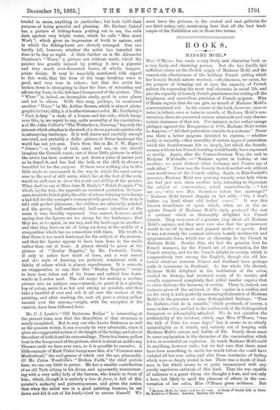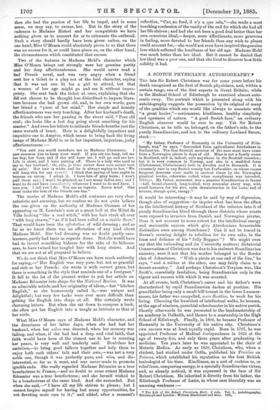BOOKS.
MADAME MOHL.*
Miss O'MEARA has made a very lively and charming book on a very lively and charming person. But she has hardly laid sufficient stress on the Scotch origin of Madame Mohl, and the remarkable effectiveness of the brilliant French setting which her homely Scotch nature received,—effectiveness, we mean, for the purpose of bringing out at once the capacity of French culture for expressing the most real, elements in social life, and also the capacity of homely Scotch genuineness for setting off the brightness and marvellous precision of French epigram. Miss O'Meara regrets that she can give no record of Madame Mohl's conversational wit. In the course of the book, however, once or twice in letters, once or twice in records of Madame Mohl's con- versation, there are preserved various admirable and very charac- teristic instances of that wit. For instance, in her rather savage philippic against the Hungarians in 1849, Madame Mohl writes to Ampere,—" All their patriotism consists in a costume." Never was there a better epigram invented to express, — whether justly or unjustly,—that unreality of certain types of patriotism which the Scotchwoman felt so deeply, but which the Scotch- woman without her French breeding would hardly have expressed so neatly. Again, after the Franco-German War, she said to Madame D'Abbadie : —" Nations squint in looking at one another ; we must distrust what Germany and France say of each other." There was the homely Scotch mother-wit, without even much trace of the French setting. Again, in Miss Gaskell's presence, Madame Mohl was praising warmly some lady whom she had just met, when another lady, intending to depreciate the subject of conversation, asked superciliously, —" Let me see,—who was Mrs. So-and-so before her marriage ?" " Madame Mohl turned sharply on her with,` Oh, I don't bother my head. about odd bodies' teases.' " It was this bizarre homeliness of spirit which, when set in the ex- quisite French of Madame Mohl's style, produced the sort of contrast which so thoroughly delighted her French friends. They were sure of a genuine ring about all Madame Mohl's sayings, and they were sure also that the genuineness would be set off by terse and piquant modes of speech. And it was not merely the contrast between homely mother-wit and epigrammatic form, which was so charming to the French in Madame Mohl. Besides this, she had the genuine love for French manners, for the French art of conversation, for the French vivacity, and for the French delight in society, which is comparatively rare among the English, though the old his- torical relations between France and Scotland have perhaps made it commoner in Scotland. As her whole life showed, Madame Mohl delighted in the institution of the salon, studied its history, had mastered many of its secrets, and usually suppressed completely that wilful insular caprice that so often destroys the harmony of society. There is, indeed, one instance given of the outbreak of this caprice in a sudden and (as the story is told) perfectly unmeaning declaration of Madame Mohl's in the presence of some distinguished Italians : "Tons les Italiens, c'est de la canaille," which produced, of course, a scene in her salon, and led to the sudden exit of the distinguished foreigners so inhospitably attacked. We do not question the authenticity of the incident, which, says Miss O'Meara, "was the talk of Paris for some days ;" but it seems to us utterly unintelligible as it stands, and entirely out of keeping with Madame Mohl's nature and habits of life. Surely there must be some explanation in the character of the conversation which led to so wonderful an explosion. In wrath Madame Mohl could do anything, however rude ; but we feel sure that there must have been something to excite her wrath before she could have violated all her own rules, and also those courtesies of feeling
which were so deeply rooted in her. There was a depth of kind- ness in her which seems to us quite inconsistent with any purely capricious outbreak cf this kind. That she was capable of rudeness to a guest whom she thought a bore, and not only a bore, but likely to spoil the pleasure of others in the con- versation of her salon, Miss O'Meara gives evidence. But
• Madame Mohl, her Scion and her Fr:ends. A Study of Social Life in Paris. By Kathleen O'Meara. London : Bentley and Sone.
then she had the passion of her life to impel, and in some sense, we may say, to excuse, her. But in the story of the rudeness to Madame Ristori and her compatriots we have nothing given us to account for or to extenuate the outbreak. Such a story should hardly have been given unless, on the one hand, Miss O'Meara could absolutely prove to us that there was no excuse for it or could have given us, on the other hand, the circumstances which constituted that excuse.
Two of the features in Madame Molars character which Miss O'Meara brings out strongly were her genuine purity and her deep affectionateness. She would never read a bad French novel, and was very angry when a friend sent her a ticket to a play not of the beat character, saying that it was not one fit for a girl to attend, but that a woman of her age might go and see it without impro- priety. She sent back the ticket at once, explaining that she did not choose to be thought less disinclined to impure litera- ture because she had grown old, and, in her own words, gave her friend a "piece of her mind." Her simple and homely affectionateness was very touching. After her husband's death, the friends who saw her passing in the street said, " Poor old soul; she looks like a lost dog going about searching for his master." And even her letters to intimate friends breathe just the same warmth of heart. Here is a delightfully impatient and impulsive one to Ampere, which seems to bring back the living image of Madame Mohl to us in her impatient, imperious, jerky affectionateness
"You said you would introduce me to Madame Chenvreux. I now summon you to keep your word. If you are too busy, tell me her day, her hour, and if she will have me, I will go and see her. Life is short, and I hate putting off. There is a lady who used to say to her husband, ' Or, cela, je veux entrer dans mon avenir tont de suite.' Her hair is white, and he is always saying to her, We will keep this for our areitir.' I think that saying of hers ought to become an axiom. I adopt it. I have lots of grey hairs ; I won't pull them out ; I won't be plucked, as I see many ladies are; and I want to do and have immediately whatever I want to do and have. I love you. I tell you I do. You are an ingrate. Never mind. One must make the best of the friends one has."
The stories of Madame Mohl's odd costumes are very char- acteristic and amusing, but we confess we do not quite believe the one given on the authority of Madame Ozanam of her appearing on M. Lomenie's arm at a great ball at the Hotel de Vile looking "like a mad witch," with her hair stuck all over " with long straws," " as if it had been rolled on a stable floor." That would have been the affectation of wild dressing ; and so far as we know there was no affectation of any kind 'about Madame Mohl. Her bad dressing was no doubt partly care- lessness, partly bad taste as regards dress. But she would have had to invent something hideous for the sake of its hideous- ness, to have twined her tangled hair with long straws. And that we are not at all prepared to believe.
We do not think that Miss O'Meara can have much authority for saying,—" Her English was very pure, but not so graceful and rich as her French; she wrote it with correct grace, but there is something in the style that reminds one of a foreigner." It fell to the lot of the present writer to put her article on Madame Recamier into shape for the National Review. It was an admirable article, and her originality of idiom,—her "kitchen English," as she humorously called it,—was unique and delightful; but very few tasks were ever more difficult than getting the English into shape at all. She certainly wrote charming letters. But when she sat down to compose a book, she often got her English into a tangle as intricate as that of her curls.
What Miss O'Meara says of Madame Mohl's character, and the dreariness of her latter days, when she had lost her husband, when her salon was deserted, when her memory was failing, and when, if she had had a deep and vital faith, that faith would have been of the utmost use to her in securing her peace, is very well and tenderly said. Doubtless her ambition,—to bring good talkers together and help them to enjoy both each others' talk and their own,—was not a very noble one, though it was perfectly pure, and wise, and die- interested, so far as it went, and was never made to promote ignoble ends. She really regarded Madame Recamier as a true benefactress to France,—and no doubt to some extent Madame R6camier was a true benefactress ; and she herself wished to be a benefactress of the same kind. And she succeeded. But when she said,—" I have all my life striven to please ; but I cannot forgive myself for having lost many opportunities, for not devoting more care to it;" and added, after a moment's reflection, "Car, au fond, it n'y a qne cela,"—she made a moat touching confession of the vanity of the end for which she had all her life striven ; and had she not been a good deal better than her own conscious ideal,—deeper, more affectionate, more generous in feeling, more devoted to her friends than any wish to please could account for,—she would not even have inspired the genuine love which softened the loneliness of her old age. Madame Mohl was much better than her ideal. But it cannot be denied that her ideal was a poor one, and that she lived to discover how little solidity it had.











































 Previous page
Previous page